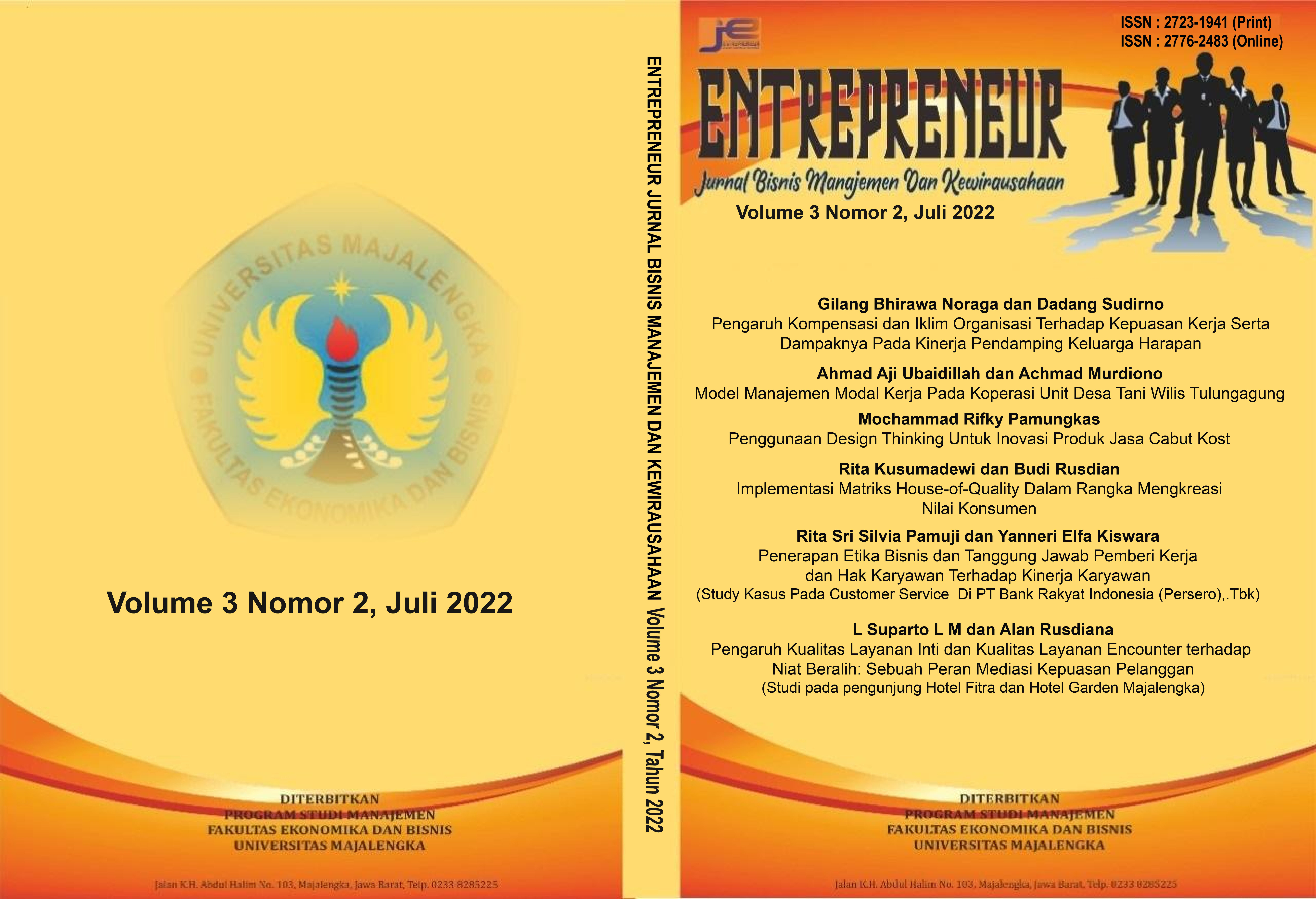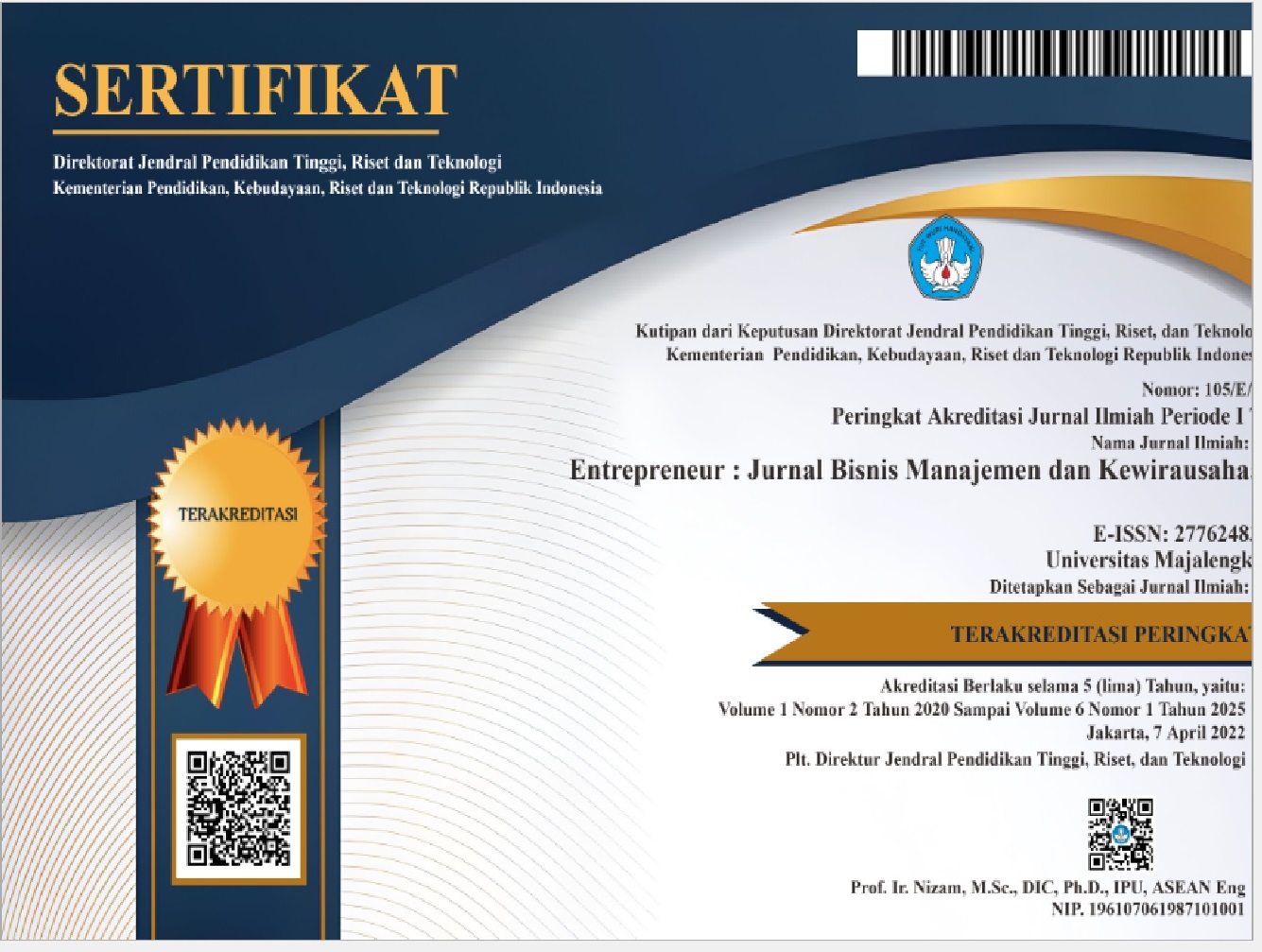Pengaruh Kompensasi dan Iklim Organisasi Terhadap Kepuasan Kerja Serta Dampaknya Pada Kinerja Pendamping Keluarga Harapan
DOI:
https://doi.org/10.31949/entrepreneur.v3i2.2766Abstract
This study aims to determine the magnitude of the effect of compensation received and perceived organizational climate on the work satisfaction of companion in the Family Hope Program, besides this research also aims to determine the effect of job satisfaction on the accompanying performance of the Family Hope Program.
The method used in this study is a quantitative method using observational collection techniques, questionnaires and literature. Koesioner was distributed to 46 samples of respondents, then tested the instrument and tested the classic assumption on questionnaire results. In testing hypotheses on research variables, multiple regression analysis and simple regression analysis were used.
The results of the study show that there is a partial and positive effect of compensation and organizational climate on job satisfaction, then it is known simultaneously that compensation and organizational climate have a positive and significant effect on job satisfaction, with a strong level of relationship between compensation and organizational climate with job satisfaction. From the results of this study, it is also known that job satisfaction has a positive and significant effect on the accompanying performance of the companion, with a moderate level of relationship between job satisfaction and the accompanying performance of the Family Hope Program.
Keywords:
compensation, job satisfaction, organizational climate, performanceDownloads
References
Adnan, R. 2014. Peran Pendamping Dalam Pemberdayaan Masyarakat Miskin Melalui Program Keluarga Harapan (PKH). Studi Pustaka, 1 (1). Melalui http://skpm.ipb.ac.id.
Ghozali, Imam. 2013. Aplikasi Analisis Multivariate Dengan Program IBM SPSS 21. Edisi.Ke-7. Semarang: Badan Penerbit Universitas Diponegoro
Ghozali, Imam. 2016. Aplikasi Analisis Multivariate dengan Program IBM SPSS 23. Edisi 8. Semarang: Badan Penerbit Undip..
Hani Handoko. 2013. Manajemen Personalia dan Sumber Daya Manusia. Yogyakarta: BPFE.
Kementrian Sosial RI. 2016. Pedoman Umum Program Keluarga Harapan (PKH). Jakarta: Direktorat Jendral Perlindungan dan Jaminan Sosial Kementrian Sosial RI.
Kementrian Sosial RI. 2016. Peraturan Mentri Sosial Tentang Pendamping Sosial. Jakarta: Mentri Sosial RI.
Kementrian Sosial RI. 2018. Peraturan Mentri Sosial Tentang Pendamping Sosial. Jakarta: Mentri Sosial RI.
Mangkunegara, A. P. 2012. Evaluasi Kinerja SDM. Bandung: Refika Aditama.
Mangkunegara, Anwar Prabu. 2013. Manajemen Sumber Daya Manusia Perusahaan. Bandung: PT.Remaja Rosdakarya.
Priyatno, Dwi. 2012. Paham Analisa Stratistik Data dengan SPSS. Yogyakarta: Media Kom.
Saungweme, R. & Gwandure, C. 2011. Organisational Climate and Intent to Leave among Recruitment Consultant in Johannesburg, South Africa. Journal Hum Ecol, 34 (3), 145-153.
Sugiyono. 2012. Metode Penelitian Kuantitatif Kualitatif dan R&D. Bandung: CV Alfabeta
Sugiyono. 2014. Metode Penelitian Kuantitatif Kualitatif dan R&D. Bandung: CV Alfabeta
Sugiyono. 2016. Metode Penelitian Manajemen. Bandung: Penerbit Alfabeta.
Susantyo.B.et.al. 2018. Optimalisasi Peran Pendamping Sosial dalam Penyelenggaraan Kesejahteraan Sosial. Jakarta: Puslitbangkesos.
Wirawan. 2015. Manajemen Sumber Daya Manusia Indonesia. Jakarta: Raja Grafindo Persada.
Wulandari.D.N. 2017. Pelaksanaan Program Keluarga Harapan (PKH) Di Kota Pekanbaru (Studi Kasus Di Kelurahan Sri Meranti Kecamatan Rumbai). JOM Fisip Vol. 4 No. 1 – Februari 2017.

Published
How to Cite
Issue
Section
License
Copyright (c) 2022 dadang sudirno

This work is licensed under a Creative Commons Attribution-ShareAlike 4.0 International License.
COPYRIGHT NOTICE
An author who publishes in the Entrepreneur: Jurnal Bisnis Manajemen dan Kewirausahaan agrees to the following terms:
1. Author retains the copyright and grants the journal the right of first publication of the work simultaneously licensed under the Creative Commons Attribution-ShareAlike 4.0 License that allows others to share the work with an acknowledgment of the work's authorship and initial publication in this journal
2. The author is able to enter into separate, additional contractual arrangements for the non-exclusive distribution of the journal's published version of the work (e.g., post it to an institutional repository or publish it in a book) with the acknowledgment of its initial publication in this journal.
3. The author is permitted and encouraged to post his/her work online (e.g., in institutional repositories or on their website) prior to and during the submission process, as it can lead to productive exchanges, as well as earlier and greater citation of the published work







